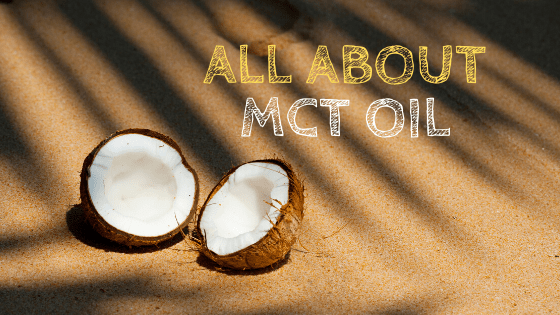With the keto diet firmly planted in the mainstream, MCT oil is becoming more and more a household name. But, besides being something everyone has heard is super keto-friendly, what else do you know about it? What are the best MCT oil uses? Are you using MCT oil correctly?
Below, we’ll demystify MCTs for you, debunk some common misconceptions and show you the best ways to use MCT oil for keto, including our go-to kfeto butter coffee recipe. Plus, we’ll explain why MCT oil and full-fat dairy products work so well together. (This post is sponsored by our partner Kalona SuperNatural).
First, what is MCT oil?
MCTs are Medium Chain Triglycerides, which you can think of as medium size saturated fats. Why is molecular chain length important? Your body metabolizes fats differently based on the carbon chain length of the fat.
MCTs are prized partly because their medium carbon chain length makes them very easily converted to ketones, which can be directly utilized as energy. On the flip-side, long-chain fats have a higher tendency to be stored as fat in the body, compared to medium and short-chain fats.
Isolated and refined MCT is liquid at room temperature, hence you get MCT oil. You can also find MCT in powder form, which is usually just MCT oil mixed with some prebiotic fiber to make MCT oil powder.
Is MCT oil natural? How is MCT oil made?
MCT oil is refined from natural sources, usually either palm kernel oil or coconut oil. This is because these plant sources naturally contain the highest amounts of MCT. The source oil is refined to isolate only the medium chain triglycerides, resulting in pure MCT oil (which doesn’t exist in nature).
How is MCT oil refined?

There are many ways in which oil can be refined, some of which utilize chemical solvents, such as hexane. However, non-chemical methods do exist. Be sure to look for “chemical-free” on the label, or ask the manufacturer, since residual hexane remains in the end product.
Also, most people prefer MCT oil that is sourced exclusively from coconut oil, since palm is linked to deforestation and orangutan habitat sustainability issues. The label will usually state 100% coconut, so be sure to check.
Are all MCT oils the same?
MCT is actually a class of fats, which is defined as fatty acids that contain carbon chains of 6, 8, 10 or 12. Each type of MCT reacts differently in the body.
Even though C6 (C for carbon, 6 chain length) exists naturally, C8 is the shortest chain of the Medium Chain Triglycerides (MCT) that is commercially available. In general, the shorter the chain of carbon molecules in the MCT, the easier/more likely it will convert to ketones, which your body can use for energy (and can’t be stored as body fat).
There are brands that sell 100% C8 MCT oil, but these generally cost more due to the additional amount of coconut oil required in the refinement process.
Since each manufacturer’s refinement process is slightly unique, MCT oils of various brands will have some ratio of C8 (caprylic acid), C10 (capric acid) and/or C12 (lauric acid) MCTs. Check with the manufacturer if these aren’t specified on the nutrition label.
What are the benefits of MCT oil?
Okay, now that you know all about MCT oil, why take it? One word: energy.
Energy boost
We stated earlier that medium-chain fatty acids convert readily to ketones, which can be used as energy by your muscles and brain. Yes, BRAIN.
That means you can power your mind with MCTs, making it a great supplement to keep your mind sharp.
This is due to the fact that MCTs go through a special pathway directly to your liver, so are absorbed and utilized quicker than longer-chain fats.
…which especially helps transitioning to keto
If you’re transitioning to eating more fat and fewer carbs, you may be experiencing a lack of energy, grogginess, or even anger. That’s where the quick energy from MCT can be a great way to bridge the gap between your body running out of carbs and before it starts burning fat (the “hanger” zone, as we like to call it).
The mental energy boost is real.
Real life example: As former caffeine junkies, we transitioned to decaf coffee cold turkey, which is normally a recipe for disaster. However, we supplemented with additional C8 MCT oil during the transition and we both experienced absolutely zero withdrawal symptoms. Incredible.
…and also helps with intermittent fasting
When you practice intermittent fasting (which works hand-in-hand with keto), your aim is to avoid the spike of insulin from eating carbs and protein. But, while carbs and protein spike insulin, pure fat doesn’t.
Since MCT oil is pure fat, it does not spike your insulin, meaning you can consume MCT oil and remain in a low-insulin “fasted” state.
While you aren’t necessarily burning as much body fat in this scenario, you are in a fasting-mimicking state which means cells will be in growth and repair mode. Plus, you won’t be prone to potential energy dips. Win-win.
…and it conserves your muscle mass
Body builders out there, or even those concerned about age-related muscle wasting, you’ll be happy to know that high blood ketone levels prevent your muscle from breaking down for use as energy. So on a very low carb diet where you might even be fasting a lot, if you supplement with MCT oil, you’ll help to conserve your muscle mass.
This is in contrast to traditional calorie-restriction diets where both fat and muscle are lost. MCTs will help ensure you maintain your muscle.
Are there MCT oil weight loss benefits? Answer: It’s complicated.
So, what about any MCT oil weight loss benefits? Most people probably just assume that MCT oil is a weight loss supplement since it’s keto-friendly, but is that true?
As we’ve previously stated, when you ingest MCTs, those MCTs will likely convert to ketones, which can be utilized as energy. If you have a certain amount of ketones in your body, you are in a state people like to refer to as nutritional ketosis. Being in this state has plenty of benefits like the energy boost we keep talking about, but also therapeutic uses, such as reducing the occurrence of seizures in epileptic individuals.
Nutritional ketosis can be achieved by your body converting stored fat to ketones (like when you fast) but also from consuming a lot of MCT oil. If losing body fat is your goal, you want to promote endogenous ketosis (endo, as in within), meaning burning your stored body fat. When you consume MCTs (exogenous), your body doesn’t need to use your stored fat to make ketones.
Basically, if you take MCT oil on top of what you already normally eat, the fat loss benefit will be marginal, at best. To get the most fat loss benefit out of MCT oil, you want to use it to replace some of the carbs and protein in your diet.
Hunger?
MCT oil is also supposed to increase your satiety, meaning make you feel less hungry. However, hunger and satiety are so subjective and multi-factorial that we can’t say for sure that it’s a true benefit. Personally, we still get plenty hungry even though we take a ton of MCT oil daily.
The Thermogenic Effect
MCTs are thought to have a thermogenic effect, which is a fancy way of saying it takes more energy to digest them in the body compared to longer-chain fats. This works because of an increase in what’s called Energy Expenditure in the body. You can loosely think of like you burn more calories processing MCT than processing other fats.
The thing to note is that it is not well-established how much this thermogenic effect actually contributes to weight/fat loss. As a result, we personally don’t put much stock in this particular benefit of MCT oil. But, it doesn’t hurt to take advantage of the potential thermogenic effect by replacing as much of the long-chain fats in your diet with MCT as possible.
Summary: We like to focus on the increased energy from MCT as its main benefit. However, if you do replace enough of your diet with MCT oil, you’ll likely see a benefit in the form of fat loss.
What are some of the best MCT oil uses?
There are plenty of ways to use MCT oil. The easiest is to take MCT oil straight-up like you would a fish oil supplement. Generally, people start slow, around 1 teaspoon per day, and ramp up the dosage, since you may need to build up some gastrointestinal tolerance to it.
On average, we personally consume 3 or more tablespoons of MCT oil per day.
But, besides being a supplement, MCT oil is extremely versatile in cooking since it’s tasteless and odorless. Here are some ideas:
- Salad dressing: MCT is completely tasteless, so it makes a great base for a salad dressing, or combined with olive oil so your dressing doesn’t solidify in the fridge.
- Mixed into a nut butter, like our favorite, macadamia nut butter
- Make decadent drinks like matcha lattes, hot chocolate, etc.
- Used as a substitute for coconut oil in most recipes, which is useful if you don’t like the taste of coconut in everything. Note, its smoke point is 320 F, lower than that of coconut oil.
But, our favorite (and seemingly everyone’s) is to use MCT oil in Keto Butter Coffee.
Our Keto Butter Coffee Recipe
Ingredients:
- 1 cup of hot black coffee (darker roast is best, since the drink is very rich–a dark Decaf works too)
- 1 tbsp pastured-raised, organic unsalted butter (Kalona)
- 1 tbsp pasture-raised, organic heavy cream (Kalona)
- 1 tbsp MCT oil (see below for our brand recommendations)
- A pinch of Pink Himalayan Salt
- Keto-friendly sweetener, to taste (a tiny bit of high-quality stevia works perfectly).
Directions:
Combine ingredients and mix, preferably with a Nutribullet-style blender as it really makes the richest, foamiest keto coffee.
A portable handheld milk frother also works, but not nearly as well (the fat will separate quicker).
Full-Fat Dairy + MCT oil = Sustained Energy
Our keto butter coffee gives us energy to last until lunch everyday. As you know, MCTs are like rocket fuel for the brain and is quickly utilized in the body. However, that also means that it is used up relatively quickly.
By adding nutrient-dense, pasture-raised, grass-fed, full-fat dairy, you gain a high-quality fat source that will give you sustained energy after the MCT is used up. It’s the perfect combination to provide both instant and sustained energy to power your mornings while remaining in a low-insulin “fasted” state.
Ingredients Matter
Just like sourcing your MCT oil is important, you will benefit from being fastidious about choosing your dairy source as well. Grass-fed dairy is much higher in beneficial nutrients like butyric acid (a short-chain fatty acid), conjugated lineoleic acid (CLA), and, of course, MCTs.

Our go-to heavy cream and butter source is Kalona Supernatural. Their dairy isn’t ultra-pasteurized (a good thing, so their cream still separates) and is pasture-raised and USDA organic. When you utilize high-quality dairy, you set yourself up for success, especially when it’s something you’re consuming every single day (like we do with keto coffee).
Decaf drinkers:
We drink decaf coffee and since we use a dark roast/brew decaffeinated using the Swiss Water Process, the flavor is still great. We experience a legit mental boost from this drink, even without the caffeine, which is a true testament to the power of MCT. Plus, you still get all the superfood benefits since coffee is one of the best sources of polyphenols (more than wine).
What you don’t want in your keto coffee!
Protein.
Protein stimulates the release of insulin, which inhibits ketosis. So, don’t spike your butter coffee with added protein, or it’ll spike your insulin.
MCT, on the other hand, as pure fat, doesn’t spike insulin or blood glucose levels, making it ideal for your morning coffee concoction.
Note: All the other ingredients in a keto coffee contain a negligible amount of protein and carbs, but not enough to worry about.
What is the best MCT oil for keto?
Here are some of our recommendations for the best MCT oil for keto, with your specific needs in mind:
The Best MCT Oil for Keto, overall (what we use daily): Bulletproof Brain Octane Oil (C8 MCT Oil)
- The only truly reputable brand that produces 100% C8 MCT
- 100% coconut-sourced
- Widely available in stores
Best Organic MCT oil: VIVA Naturals Organic MCT Oil
- USDA Organic
- 100% coconut-sourced
- 60% C8 / 40% C10
Best MCT Oil Powder: Garden of Life Organic MCT Powder
- USDA Organic
- 58% C8 / 32% C10 / 8% C12
- 3g of organic acacia prebiotic fiber
- 100% coconut-sourced
Best Budget MCT oil: NOW MCT Oil
- 50% C8 / 30% C10 / 20% C12
- Made from both coconut oil and palm kernel oil
OK! You’re now up-to-speed on MCT oil. It’s a truly indispensable piece of our daily nutrition and we hope you find some uses for MCT oil as well.
If we left anything out or you have any questions, feel free to comment or email us!
Thanh Vo, MSc
Related posts
5 Comments
Leave a Reply Cancel reply
Howdy!

Sonja & Thanh: foodies at heart, globetrotters and avid discoverers of keto, low carb and organic products. Based out of Austin, Texas, we scour the world for food options that fit our healthy, active lifestyles.
Learn more




You got a very excellent website, Gladiola I noticed it through yahoo.
I am continuously browsing online for tips that can aid me. Thx!
You are my aspiration, I have few web logs and often run out from to brand.
You have brought up a very wonderful points, regards for the post.
I would like to thnkx for the efforts you have put in writing this blog. I am hoping the same high-grade blog post from you in the upcoming as well. In fact your creative writing abilities has inspired me to get my own blog now. Really the blogging is spreading its wings quickly. Your write up is a good example of it.